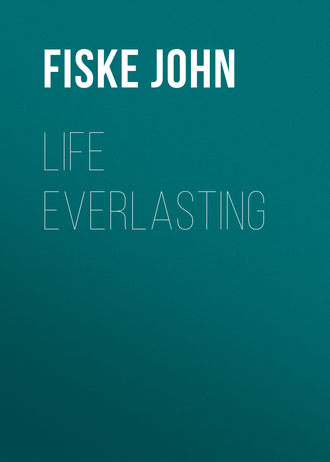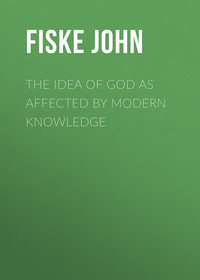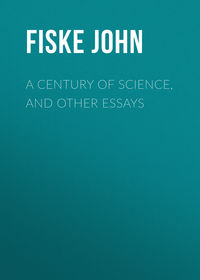 полная версия
полная версияLife Everlasting
This unsettling of men's minds was of course indefinitely increased by the revolt of Descartes against the scholastic philosophy, by Newton's immense contributions to physics, and by such discoveries as those of Harvey, Black, and Lavoisier, which showed by what methods truth could be obtained concerning Nature's operations, and how different such methods were from those by which the accepted systems of theology had been built up. The result has been wholesale skepticism directed against everything whatever that now exists or has ever existed in the shape of an ancient belief. This result was first reached in France about the middle of the eighteenth century, when the thoughts of Locke and Newton were eagerly absorbed in a community irritated beyond endurance by social injustice, and in which the church had done much to forfeit respect. Thus came about that violent outbreak of materialistic atheism which, in spite of its generous aims and many admirable achievements, is surely one of the most mournful episodes in the history of human thought. The French philosophers set an example to three generations; the note struck by Diderot and Buffon and D'Alembert continued to resound until the scientific horizon had become radiant in every quarter with the promise of a brighter day, and its echoes have not yet died. It was but lately that the voice of Lamettrie was heard again from the lips of Strauss and Buechner, and even to-day we may sometimes be entertained by a belated eighteenth century naturalist who is fully persuaded that his denial of human immortality is an inevitable corollary from the doctrine of evolution. Indeed the progress of scientific discovery has been so rapid since the time of Diderot, its achievements have been so vast, its results so multifarious and so dazzling, that it has well-nigh absorbed the attention of the foremost minds. The dogmas of theology seem stale and empty, the speculations of metaphysics vain and unprofitable, in comparison with the fascinating marvels of chemistry and astronomy, of palæontology and spectrum analysis; and it is natural that we should rejoice over the methods of research that are enabling us thus to wrest from Nature a few of her long guarded secrets, and to make up our minds to have nothing to do with conclusions that are not obtained or at least verified by such scientific methods. Daily we hear sounded the praises of observation, of experiment, of comparison; we are warned against long deductions, since the strength of any chain of arguments is measured by that of its weakest link, and experience is perpetually teaching us, to our vexation and chagrin, that what reason says must be so is not so, that facts will not fit hypothesis. The more things we try to explain, the better we realize that we live in a world of unexplained residua. Away, then, with all so-called truths that cannot be tested by weights and measures, or other direct appeals to the senses! Your modern philosopher will have nothing of them. His system is composed, from start to finish, of scientific theorems. As for the higher speculations, the deeper generalizations, in which philosophy has been wont to indulge concerning the aim and meaning of existence, he waves them away as profitless or even mischievous. The world is full of questions as pressing as they are baffling. As I once heard Herbert Spencer say, "You cannot take up any problem in physics without being quickly led to some metaphysical problem which you can neither solve nor evade." It was in order to secure philosophic peace of mind that Auguste Comte undertook to build up what he called Positive Philosophy, in which the existence of all such problems was to be complacently ignored, – much as the ostrich seeks escape from a dilemma by burying its head in the sand. In a far more reverent and justifiable spirit the agnostic like Huxley or Spencer acknowledges the limitations of the human mind and builds as far as he may, leaving the rest to God.
In the fervour of this modern reliance upon scientific methods, we are warned with especial emphasis against all humours and predilections which we may be in danger of cherishing as human beings. In a new sense of the words we are reminded that "the heart of man is deceitful and desperately wicked," and if any belief is especially pleasant or consoling to us, forthwith does Science lay upon us her austere command to mortify the flesh and treat the belief in question with exceptional disfavour and suspicion. Thus there has grown up a kind of Puritanism in the scientific temper which, while announcing its unalterable purpose to follow Truth though she lead us to Hades, takes a kind of grim satisfaction in emphasizing the place of destination.
Now there can be no sort of doubt that this rigid and vigorous scientific temper is in the main eminently wholesome and commendable. In the interests of intellectual honesty there is nothing which we need more than to be put on our guard against allowing our reasoning processes to be warped by our feelings. Nevertheless in steering clear of Scylla it would be a pity to tumble straight into the maw of Charybdis, and it behooves us to ask just how far the canons of scientific method are competent to guide us in dealing with ultimate questions. Science has given us so many surprises that our capacity for being shocked or astounded is well-nigh exhausted, and our old unregenerate human nature has been bullied and badgered into something like humility; so that now, at the end of the greatest and most bewildering of centuries, we may fitly pause for a moment and ask how fares it, in these exacting days, with that Unseen World which man brought with him when he was first making his appearance on our planet? And what has science to say about that time-honoured belief that the human soul survives the death of the human body?
The position that science irrevocably condemns such a belief seems at first sight a very strong one and has unquestionably had a good deal of weight with many minds of the present generation. Throughout the animal kingdom we never see sensation, perception, instinct, volition, reasoning, or any of the phenomena which we distinguish as mental, manifested except in connection with nerve-matter arranged in systems of various degrees of complexity. We can trace sundry relations of general correspondence between the increasing manifestations of intelligence and the increasing complications of the nervous system. Injuries to the nervous structure entail failures of function, either in the mental operations themselves or in the control which they exercise over the actions of the body; there is either psychical aberration, or loss of consciousness, or muscular paralysis. At the moment of death, as soon as the current of arterial blood ceases to flow through the cerebral vessels, all signs of consciousness cease for the looker-on; and after the nervous system has been resolved into its elements, what reason have we to suppose that consciousness survives, any more than that the wetness of water should survive its separation into oxygen and hydrogen?
So far as our terrestrial experience goes there can be but one answer to such a question. We have no more warrant in experience for supposing consciousness to exist without a nervous system than we have for supposing the properties of water to exist in a world destitute of hydrogen and oxygen. Our power of framing conceptions is narrowly limited by experience, and when we try to figure to ourselves the conditions of a future life we are either hopelessly baffled at the start or else we fall back upon grossly materialistic imagery. The savage's ghost-world is a mere repetition of the fights and hunts with which he is familiar. The early Christians looked forward to a speedy resurrection from Sheol, followed by an endless bodily existence upon a renovated earth. Dante's pictures of the Unseen World are often so intensely materialistic as to seem grotesque in our more truly spiritual age. Popular conceptions of heaven to-day abound in symbolism that is confessedly a mere reflection from the world of matter; insomuch that persons of sufficient culture to realize the inadequacy of these popular images are wont to avoid the difficulty by refraining from putting their hopes and beliefs into any definite or describable form. Among such minds there is a tacit agreement that the unseen world must be purely spiritual in constitution, yet no mental image of such a world can be formed. We are all agreed that life beyond the grave would be a delusion and a cruel mockery without the continuance of the tender household affections which alone make the present life worth living; but to imagine the recognition of soul by soul apart from the material structure in which we have known soul to be manifested, apart from the look of the loved face, the tones of the loved voice, or the renewed touch of the long vanished hand, is something quite beyond our power. Even if you try to imagine your own psychical activity as continuing without the aid of the physical machinery of sensation, you soon get into unmanageable difficulties. The furniture of your mind consists in great part of sensuous images, chiefly visual, and you cannot in thought follow yourself into a world that does not announce itself to you through sense impressions. From all this it plainly appears that our notion of the survival of conscious activity apart from material conditions is not only unsupported by any evidence that can be gathered from the world of which we have experience but is utterly and hopelessly inconceivable.
The argument here summarized is in no way profound or abstruse; it is extremely obvious, and as its propositions cannot well be controverted, it has had great weight with many people. I dare say it may be held responsible for the larger part of contemporary skepticism as to the future life. People have grown accustomed to demanding scientific support for doctrines, whereas this doctrine is not only destitute of scientific support but lands us in inconceivabilities; is it not, then, untenable and absurd? Such is the common argument. There are those who seek to meet it with inductive evidence of the presence of disembodied spirits or ghosts which hold direct communication only with certain specially endowed persons known as mediums. Concerning such inductive evidence it may be said that very little has as yet been brought forward which is likely to make much impression upon minds trained in investigation. If its value as evidence were to be conceded, it would seem to point to the conclusion that the grade of intelligence which survives the grave is about on a par with that which in the present life we are accustomed to shut up in asylums for idiots. On the whole the mediumistic ideas and methods are frankly materialistic, their alleged communications with the other world are through sights and sounds, and if their pretensions could be sustained the result would be simply the rehabilitation of the primitive ghost-world. Their theory of things moves on so low a plane as hardly to merit notice in a serious philosophic discussion.
To return to the argument that the doctrine of the survival of conscious activity apart from material conditions is unsupported by experience and is inconceivable, we may observe that it is inconceivable just because it is entirely without foundation in experience. Our powers of conception are narrowly determined by the limits of our experience, and when that experience has never furnished us with the materials for framing a conception we simply cannot frame it. Hence we cannot conceive of the conscious soul as entirely dissociated from any material vehicle.
Now we are prepared to ask, How much does this famous argument amount to, as against the belief that the soul survives the body? The answer is, Nothing! absolutely nothing. It not only fails to disprove the validity of the belief, but it does not raise even the slightest prima facie presumption against it. This will at once become apparent if we remember that human experience is very far indeed from being infinite, and that there are in all probability immense regions of existence in every way as real as the region which we know, yet concerning which we cannot form the faintest rudiment of a conception. Within the past century the study of light and other radiant forces has furnished us with a suggestive object-lesson. The luminiferous ether combines properties which are inconceivable in connection. How curious to think that we live and move in an ocean of ether in which the particles of all material things are floating like islands! But how amazing to learn that this ocean of ether is also an adamantine firmament! Is not this sheer nonsense? an ocean firmament of ether-adamant! Yet such seems to be the fact, and our philosophy must make the best of it. Now suppose that all this world were crowded with disembodied souls, an infinite throng most aptly called "the majority," a thousand or more on every spot in space as broad as the point of a cambric needle, in what way could we become aware of their existence? Clearly in no way, since we have no organ or faculty for the perception of soul apart from the material structure and activities in which it has been manifested throughout the whole course of our experience. There we will suppose are the countless millions, the existence of any one of whom, could we detect it, would suffice to demonstrate the doctrine of a future life, and yet, for lack of the requisite means of communication, all this evidence is inaccessible. Such an illustration shows that "the entire absence of testimony does not even raise a negative presumption except in cases where testimony is accessible." The reason is obvious. Until we can go wherever the testimony may be, we are not entitled to affirm that there is an absence of testimony. So long as our knowledge is restricted by the conditions of this terrestrial life, we are not in a position to make negative assertions as to regions of existence outside of these conditions. We may feel quite free, therefore, to give due weight to any considerations which make it probable that consciousness survives the wreck of the material body.
We are now in a position to see the fallacy of Moleschott's often-quoted aphorism, "No thought without phosphorus!" When this saying was a new one, there were worthy people who felt that somehow it was all over with man's immortal soul. With phosphorus you light your candle, and with phosphorus you discover Neptune and write the Fifth Symphony; how charmingly simple and convincing! And yet was anything save a bit of rhetoric really gained by singling out phosphorus among the chemical constituents of brain tissue rather than nitrogen or carbon? Suppose the dictum had been, "No thought without a brain." The obvious answer would have been, "If you refer to the present life, most erudite professor, your remark is true, but hardly novel or startling; if you refer to any condition of things subsequent to death, pray where did you obtain your knowledge?"
Nevertheless this point cannot be disposed of simply by exhibiting the flaw in Moleschott's rhetoric. His remark rests upon the assumption that conscious mental phenomena are products of the organic tissues with which they are associated. This is of course the central stronghold of materialism. A century ago the case was very boldly put when we were asked to believe that the brain secretes thought as the liver secretes bile. Nobody to-day would think of making such a comparison, but it is more cautiously stated that consciousness is a "function" of the brain, or at all events of the nervous system, even as bile-making is a function of the liver. Before we yield any modicum of assent to this statement we may observe that "function" is a word with a wide range of meaning, and we must insist upon some closer definition. Here materialism calls to its aid the discovery of the correlation and equivalence of forces, one of the most stupendous achievements of our century. We now know that heat and light and electricity and actinism are not forces generically distinct and isolated each from the others. All are specific modes of molecular motion, transformable one into another at any moment as naturally as a cloud condenses into raindrops. Any such molecular motion, moreover, may come from the arrested visible motion of a mass, and may in turn be liberated so as to resume the form of visible motion, as when an electric current is transformed into the onward movement of the trolley car. The change in our conception of Nature that has been wrought by this wonderful discovery is more profound than all changes that went before. The balance in the hands of the chemist had already proved that no matter is ever lost but only transformed, and that every material form at any moment visible owes its existence to the metamorphosis of some previous form. So now it was further shown that the myriad properties or qualities of matter are simply the expression of myriads of activities which are all in a final analysis motions; that no motion is ever lost but only transformed, and that every kind of motion at any moment perceptible – whether in the form of movement through space, or of light, or heat, or electricity, or the actinism that builds up the green stuff in the leaves of plants – owes its existence to the metamorphosis of some previous kind of motion. Every living organism is a marvellous aggregate of divers forms of matter performing divers characteristic motions, and the sum total of these motions is the whole of life, as regarded purely on its physical side. When we take food we bring into the system sundry nitrogenous and hydrocarbon compounds, each of which is alive with little energies or latent capacities for certain kinds of motion. The oxygen of the air, especially in its unstable form of ozone, is a powerful inciter of chemical motions, and when we breathe it in, the little latent capacities presently become actual motions. Some of them are realized in the rhythmical movements of heart and lungs, some in the undulations that sustain the animal temperature, some in the formation of the tiny drops that collect in a secreting gland, some in the repair of tissue by the substitution of new complex molecules for old ones that are broken down, some in the contraction of a group of muscles, some in the changes within the substance of nerve that accompany conscious thought, sensation, and volition. Ah, yes, here we come to it at last! We do not doubt that all these myriad motions are members in a series of transformations, wherein the appearance of each results from the disappearance of its predecessors. We have neither the instruments nor the calculus to prove this in the infinite multitude of details, but the general theory has been so completely established wherever it is accessible to instruments and calculus that we can have no hesitation in granting its universality wherever matter and motion are concerned in any shape or amount. No scientific man will for a moment doubt that the little vibratory discharge between cerebral ganglia which accompanies a thought is one member in a series of molecular motions that might be measured and expressed in terms of quantity if we only possessed an apparatus sufficiently delicate and subtle.
Now if such is the case with the little physical motion within the brain, how is it with the accompanying thought? Does the correlation obtain between physical motions and conscious feelings? Are states of consciousness links in the Protean series of motions, in such wise that the vibration within the brain produces the thought or feeling? In other words is the thought or feeling merely a transformed vibration? Does a certain amount of vibration perish to be replaced by an exact equivalent in the shape of thought? and then does the thought perish in the act of giving place to other vibrations which end in a visible motion of muscles? as when, for example, you hear the sound of a bell and start toward the door.
On this point there has been much confusion of ideas. When I put the question to Tyndall in conversation, nearly thirty years ago, he seemed to think that there must be some such completeness of correlation between the physical and the psychical; but his mind was not at ease on the subject. Herbert Spencer, in his "First Principles," rather cautiously took the same direction and tried to show how a certain amount of motion might be transformable into a certain amount of feeling. He observed that the consciousness of effort or muscular strain in lifting a heavy weight is more intense than in lifting a light weight, and that when a loud sound sets up atmospheric vibrations of great amplitude the shock to our auditory consciousness is correspondingly greater than in the case of a gentle sound which sets up vibrations of small amplitude. But when he comes to the inner regions of thought and emotion which are not reached by percussion and strain, he is less successful in finding illustrations. It is especially worthy of note that in the final edition of "First Principles," published in this year 1900 and in Spencer's eighty-first, he goes very far toward withdrawing from his original position, while in his Preface he calls attention to this change as one of the most important in the book. In my "Cosmic Philosophy," published in 1874, I maintained that to prove the transformation of motion into feeling or of feeling into motion is in the very nature of things impossible. In order to be convinced of this, let us go back a few years and ask how the great doctrine of the correlation of forces became established. Its first absolute verification occurred about 1846, when Dr. Joule showed "that the fall of 772 lbs. through one foot will raise the temperature of a pound of water one degree of Fahrenheit."2 When this was proved it gave us the mechanical equivalent of heat, and the theory acquired a truly scientific character. Similar quantitative correlations were established in the case of heat and chemical action by Dulong and Petit, and in the case of chemical action and electricity by Faraday. The truth of the theory is wholly a question of quantitative measurement. Now you can measure heat, you can measure electricity, and since the action of nerves in all probability consists of undulatory motions it is to some extent measurable, and doubtless would be completely measurable had we the means. But when you come to thoughts and emotions, I beg to know how you are going to work to give an account of them in foot-pounds! It is not simply that we have no means at hand, no calculus equal to the occasion; the thing is absurd on its face. It is as true to-day as it was in the time of Descartes that thought is devoid of extension and cannot be submitted to mechanical measurement.
It appears to me, therefore, that what we should really find, if we could trace in detail the metamorphosis of motions within the body, from the sense-organs to the brain, and thence outward to the muscular system, would be somewhat as follows: the inward motion, carrying the message into the brain, would perish in giving place to the vibration which accompanies the conscious state; and this vibration in turn would perish in giving place to the outward motion, carrying the mandate out to the muscles. If we had the means of measurement we could prove the equivalence from step to step. But where would the conscious state, the thought or feeling, come into this circuit? Why, nowhere. The physical circuit of motions is complete in itself; the state of consciousness is accessible only to its possessor. To him it is the subjective equivalent of the vibration within the brain, whereof it is neither the cause nor the effect, neither the producer nor the offspring, but simply the concomitant. In other words the natural history of the mass of activities that are perpetually being concentrated within our bodies, to be presently once more disintegrated and diffused, shows us a closed circle which is entirely physical, and in which one segment belongs to the nervous system. As for our conscious life, that forms no part of the closed circle but stands entirely outside of it, concentric with the segment which belongs to the nervous system.
These conclusions are not at all in harmony with the materialistic view of the case. If consciousness is a product of molecular motion, it is a natural inference that it must lapse when the motion ceases. But if consciousness is a kind of existence which within our experience accompanies a certain phase of molecular motion, then the case is entirely altered, and the possibility or probability of the continuance of the one without the other becomes a subject for further inquiry. Materialists sometimes declare that the relation of conscious intelligence to the brain is like that of music to the harp, and when the harp is broken there can be no more music. An opposite view, long familiar to us, is that the conscious soul is an emanation from the Divine Intelligence that shapes and sustains the world, and during its temporary imprisonment in material forms the brain is its instrument of expression. Thus the soul is not the music, but the harper; and obviously this view is in harmony with the conclusions which I have deduced from the correlation of forces.









